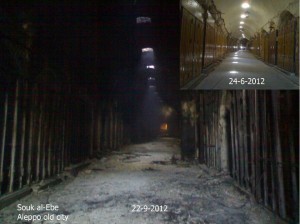Social Media Monitor 01-10-2012

Aleppo Souks turn to ashes
The most widely circulated news about the fighting in Aleppo last week concerned the fire that destroyed parts of the city’s old souk, one of the longest vaulted marketplaces in the world.

Social media websites witnessed many heated discussions about who was responsible for the fire.
Shadi Abu Karam, a Syrian journalist living in Beirut, accused members of the Free Syrian Army, FSA, of setting the souk on fire, as well as destroying other buildings that the FSA declared it had controlled.
“Old Aleppo was burnt down; the city that no tyrant was able [to occupy] was burnt. The [FSA] occupied the old hotels surrounding the castle, then looted and burnt them and everybody in Aleppo knows this,” he wrote on Facebook.
Others defended the FSA and said it had nothing to do with these incidents. Syrian author Khawla Hadid believes that the regime alone would benefit from what happened, and that the FSA never entered the areas Abu Karam mentioned.
“Anyone who believes that a young man who risks his life fighting the regime could have the time for looting is insane,” she wrote on Facebook.
Syrian activists issued a statement asking the international community to investigate into the burning of the old souk.
“We would like to reiterate the importance of the old souk as a site recognized by the [United Nation’s culture agency] UNESCO,” read the statement published on Facebook by activist Hiam Gamil. “We urge the UNESCO and [other] relevant international institutions to do whatever it takes to uncover the perpetrators.”
“Forgive the murderers”
After the rise in violence in Syria, many have demanded that the crimes against them be avenged. Many others, however, have refused to listen to these calls, saying that to rebuild Syria the murderers should be forgiven.

Hazem Ibrahim is a Syrian translator who was paralyzed when he was hit by a bullet as a child. His father also received 12 bullets during the same incident but stayed alive.
“On the same day of the incident, my family and I decided to forgive the perpetrator, whom we do not know,” he wrote on Facebook. “Hatred and revenge will only backfire. Forgiveness is the only way forward; one cannot build one’s homeland with hate.”
The administrators of Aleppo Now Facebook page called on their subscribers to start forgiving whoever had done them wrong.
“Aleppo will be back the way it was when people love each other,” wrote Abu Halab, one of the page administrators. “Let’s start by saying ‘May God forgive everyone we hate.’ Forgive as much as you can, you have nothing to lose.”
Political activist Ghassan Yassin, who lost a brother and many cousins when parts of the countryside surrounding Aleppo were recently shelled, addressed Kinana Alloush, a reporter of the pro-regime Al-Dunya TV. Alloush had shown the bodies of Yassin’s relatives and described them as “terrorists”.
“We will sweep off terrorism from the streets of Aleppo and all of Syria, too, just like you said in your report, Kinana,” Yassin wrote on Facebook. “I promise that I will ask for nothing more than a fair trial for you. But I think my mother will ask you the following: ‘Why didn’t you people give me the remains of my son Bassam to bury them, so that I could read [verses of the Qur’an] for him every Friday and visit his tomb on holidays?’ You have to prepare your statements for the judge, Kinana. What is more difficult, though, is finding something to say to my mother.”
Under the title “Start with Yourself” Palestinian journalist Bilal Z’aiter, who live in Damascus, addressed the Syrian opposition in a comment he wrote on Facebook, asking it to conduct self-criticism.
“The truth is that if you do not believe that there should be room for forgiveness in Syria, I would like to see members of the Syrian National Council and the Revolutionary Board hanged in Marjeh Square [in Damascus] before I see any of the regime’s beasts hanged in that same place,” Z’aiter wrote.
Critiquing the Revolution on Facebook
Several Facebook pages dedicated to “revolutionary critique” have been recently launched. These pages, such as Dabbous Thaqafi (Cultural Pin) or Fazlaqa Thawriyya (Revolutionary Smart Mouths), usually publish photos of Syrian activists, along with bitter comments.

Fadi Zaidan, a Syrian photojournalist who lives in Beirut, wrote that he encourages such initiatives.
“The appearance of such Facebook pages made many of us realize that there are people waiting for our empty babbling to criticize it, sometimes too harshly,” he wrote on Facebook. “It’s a nice attempt, even though it might have come late.”
Ninar Hassan, a student in theater studies who fled to Paris after the start of the protests in Syria, also welcomed the launching of Dabbous Thaqafi.
“Since freedom of speech is a recognized right, I think this Facebook page deserves to be promoted,” she wrote on Facebook. “I think we’ll all soon be targets [for this page].”
